
moon Review
Stop me if you’ve heard this one before. You boot up a classic RPG, and after inputting your name and sitting through walls of expositional text you start your journey as a gallant Hero on a quest to reach a dragon’s castle. You get your mission from the King, travel the land, slay every monster you see for experience points, go into people’s houses to rifle through their belongings for treasure, and do everything you can to accomplish your goal. This sounds like a fairly traditional RPG, right?
moon is not that. Heck, it’s not even an RPG. It's widely considered to be the first Anti-RPG, and it was one of the games to inspire the now wildly successful Undertale. It became something of a cult classic when it released in 1997 for the original PlayStation, but it has remained stuck in Japanese until this year, as Onion Games has published the game in the west for the first time. It's become common practice in this modern era to bring back classic games to currently released systems, but at the same time, it is rather unfortunate that many developers dilute the original work with some needless additions or visual tweaks. For better or for worse, it's admirable that moon was seemingly brought back from 1997 in its entirety as it was. The visuals and gameplay have been untouched, making this re-release exist as a time capsule that preserves all of the charm and flaws of the original 1997 game.
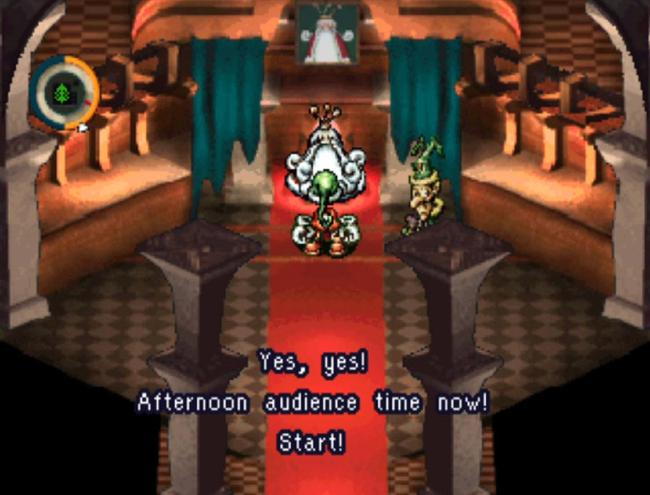
In moon you are not the hero. After being told to stop playing video games and go to bed, a young boy finds himself sucked into his TV. He finds himself in the very world from the game, but with no visible form and only enough stamina to survive half a day. The so-called hero of this world is mindlessly traveling the land, mercilessly killing any creature he comes across and causing havoc for people. You are given one goal: Cultivate Love. Travel the world of moon and fix the chaos the hero caused. Listen to people’s problems, save the souls of the animals the hero has killed, and engross yourself in this land’s strange culture.
Every time you help someone you gain Love, which is used to level up your character. Like every other mechanic that was considered a staple of the genre back in 1997, moon approaches experience and leveling with a unique twist. I’m going to probably mention the word “unique” often in this review, but it's important to keep its release date in mind. To my knowledge, there are almost no games that did what moon did when it came out. There are plenty that have tried to do what it accomplished since, with varying success.
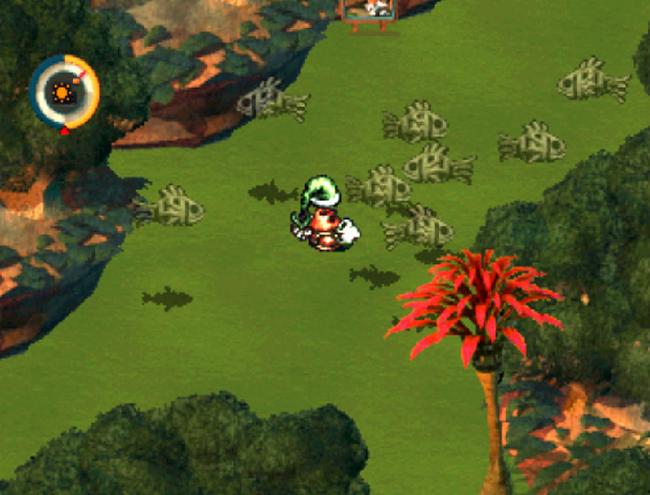
You can only survive in this world with Love, and the higher Love level you have, the longer you can literally survive in moon’s world. The game works on a real-time progression system, with a day and night mechanic layered on top of a weekly calendar system. Every NPC in the game has a schedule, with variations applied to it based on what day of the week it is and how far you’ve progressed. I would not be surprised in the slightest if I learned that Eiji Aonuma and Yoshiaki Koizumi had played moon before beginning development on Majora’s Mask, which came out 3 years after. It's incredibly impressive that it feels much more in-depth and yet more obtuse than Majora when taking that into consideration.
moon can be unforgiving at times, but given the fact that you can just wait until the next day to reattempt most time sensitive events this is almost a non-issue. Some might find an issue with the fact that a lot of the game is spent sitting and waiting for events to take place, but the game owns up to this. It’s not forcing you to do this since a large amount of content is optional, but you’ll find it difficult to not quickly fall in love with the charming world and want to go out of your way to help these people.
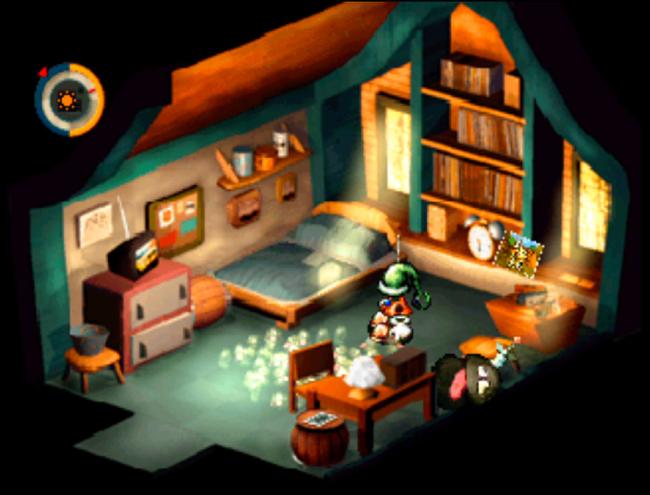
At the beginning of the game, you can only manage to do one or two things a day, and if you fail to reach your bed before your time runs out you get a game over and lose all the progress made that day. Your dreams are where you automatically save the game and level up, giving you a recap of any accomplishments you made that day. As your level increases you can do more events within a day, and then slowly start understanding how moon expects you to approach it.
What makes this game so fascinating yet frustrating is that it explains almost none of this. In modern games, mechanics can be over explained and leave the player feeling like the developer doesn’t respect their intelligence. moon was released when developers could keep the explanations to the manuals included in the game, which have been mostly phased out. The moon manual is extensive, and thankfully Onion Games has provided a translation of this on their website. I highly recommend reading it if you feel stumped, it's very helpful. You can find it here.
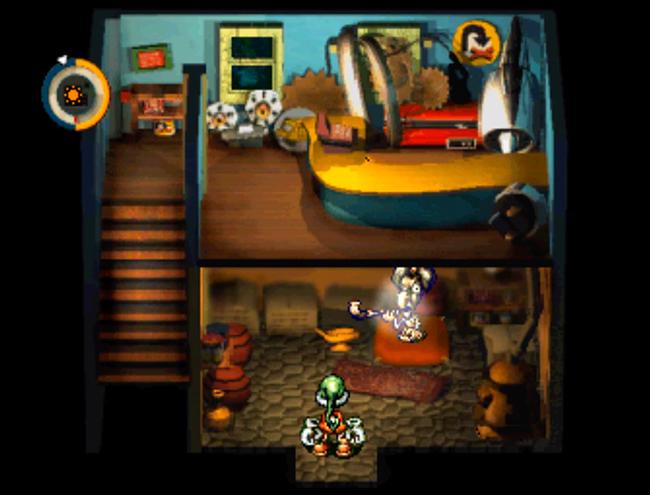
Once you understand how all the mechanics work, moon is a very simple game at its core. The most straightforward mechanic is how to save the souls of the animals that the hero has slain. Every monster corpse will give you a vague explanation on how to catch the soul, leaving you to figure out exactly to save them through experimentation. Some of the souls are simply hanging out near for an easy catch, some will require some chasing around, some need to be given an item, and some will require an extensive side quest. There are 51 dead animals spread throughout the world, and you’ll get a different amount of Love points for each, depending on the animal.
As I mentioned earlier in order to keep the game’s identity the same, there was no effort in modernizing the gameplay or visuals. The game’s unique aesthetic of combining 2D sprites, pre-rendered backgrounds, and claymation characters has been brought over with no adjustments. You’re playing the game at a higher resolution of course, but the assets have seemingly not been touched at all. I wouldn’t have it any other way however, since the original visual style is so brilliant that I can’t imagine having any part of it accidentally marred by over-eager developers trying to modernize it. It instantly sets a bizarre tone that no game before or since has ever tapped into, creating an almost ugly beauty to it all.
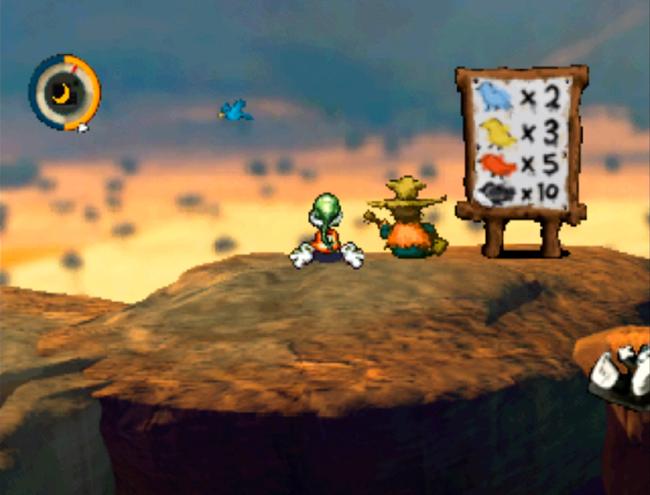
While keeping the game as is was admirable for ensuring modern audiences get the same experience as those who first played it, it has also aged the game in certain areas. There is no run button in moon, you walk from place to place at a pace lacking any sense of urgency.). This combined with the tedium of waiting around for events to happen could easily leave a lot of players being bored for a lot of the experience.
moon’s world being rather small makes the slow walking speed work rather well once you get into the swing of things. Once you get a house of your own that's located in the center of the world, this almost becomes a nonissue. It would be impossible to have a faster movement speed without completely breaking the balance of the game as it is. This speed, coupled with the passage of time, is baked into the game design. This didn’t bother me, but I can acknowledge that this is not a game for everyone.
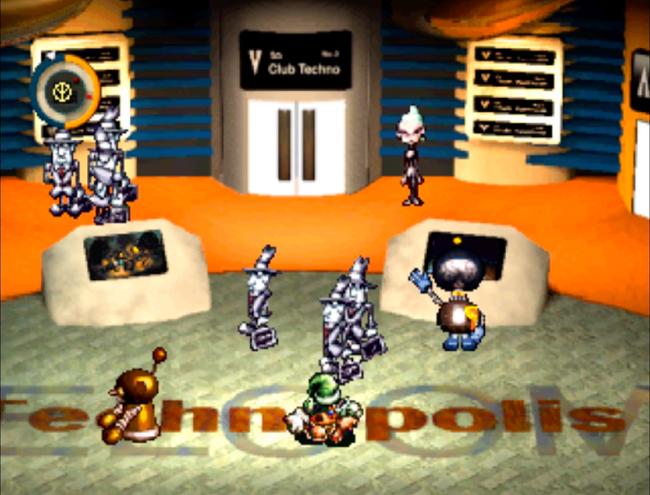
The soundtrack is just as charming and strange as the rest of the game. In another way that shows how ahead of its time this game was, your experience with the music is customizable. You gather MDs around the world, either from characters or from buying them from a music enthusiast hanging out in a cave. You program in a playlist of your available songs, and can go through them in game with the left or right bumpers. You can even play the game without music if you wish, only hearing the music pre-programmed to play in certain parts of the game. It's a very laid back approach to sound design that fits the game’s tone very well.
Progression can be very obtuse, to the point that I had to use a guide just to finish the game. If you choose not to do that however, you’ll be rewarded with one of the most surprisingly paced games ever made. Every area of the world has a unique set of characters who vaguely or explicitly tell you about their problems, and it's up to you to figure out how best to help them. There are sometimes mini games that all play out differently, such as gambling on which color bird will fly by, fishing, a rhythm game, and much more. The mandatory events in the later parts of the game require an extreme amount of exploration, with a lot of trial and error needed to effectively figure out where you need to go. I’m being vague so I don’t spoil any of the surprises, but figuring out the solutions to the games problems on your own is immensely satisfying.
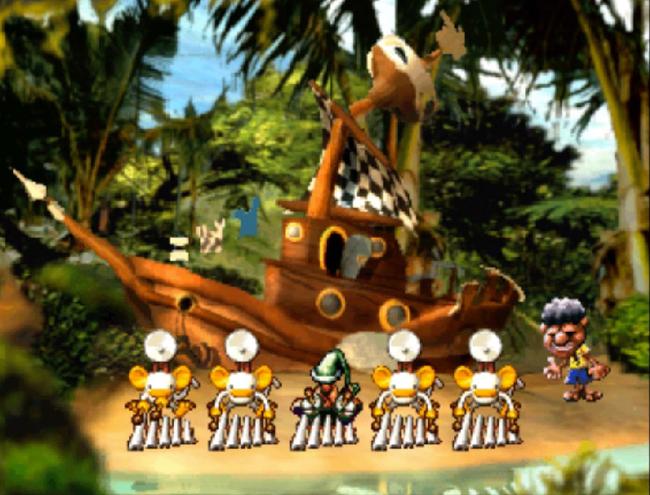
You are given a large inventory of items you collect, with some needed to advance characters’ side stories and some being completely useless. It would be easy for players using a guide for only the mandatory events to miss out on the plethora of optional stories spread throughout moon’s complicated world. Another comparison to be made with Majora’s Mask, where I find the game’s true heart to exist in these smaller stories of people trying to find their place in the world.
There’s a casual vibe to the whole experience despite some of the strange and even sometimes brash characters. Few games are able to juggle surrealism and immersion, but moon does this very well. It effortlessly accomplishes the weird and surreal tone, and the translation conveys this very well. At a first glance many characters’ dialogue could seem poorly translated, but the more time you spend with moon the more you realize how intentional this is. Every character feels unique in how they talk, and I can only imagine that translating a game that handles this complicated writing style was no easy feat. Since a large amount of moon is spent talking to people, a good translation was essential and thankfully puts a nice bow on the entire experience.
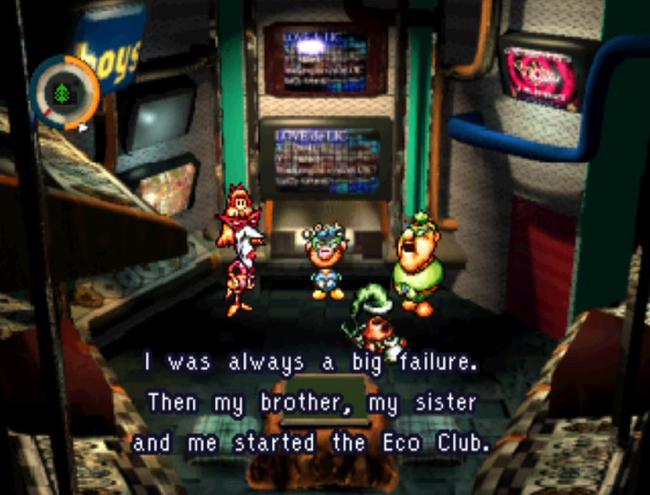
I think calling moon a “parody” of the RPG genre is both slightly fitting yet doesn’t give it enough credit. It’s rather impressive that a smaller budget game released over 20 years ago has aged as well as it has. In so many ways it feels incredibly ahead of its time, with a focus on minute details so extensive that most modern games can’t even match.
Genre defining works rarely stand the test of time, but moon is a rare exception to this rule. It not only holds up today, but is probably still one of the best “anti-games” out there. In addition to a quirky sense of self-awareness you’d come to expect from this genre, there’s a raw authenticity that makes it stand out among the rest. It understands its own simplicity and scale, and tells a story that fits exactly what it sets out to do. The ending isn’t bombastic in any way, but the experience is simple enough to benefit the obtuse storytelling. moon a great game that is unapologetic about the flaws in a way that feels earnest, which is hard to say about almost any other game trying to achieve that.